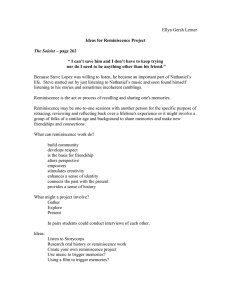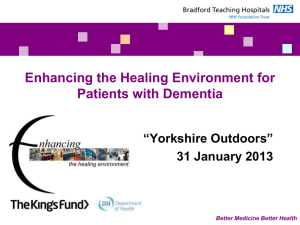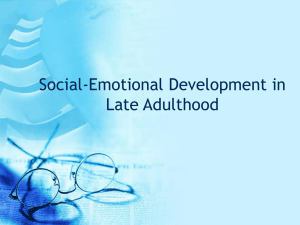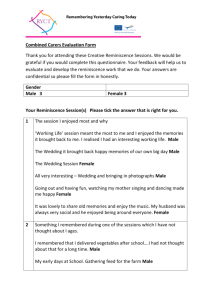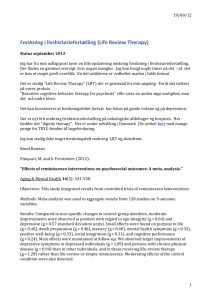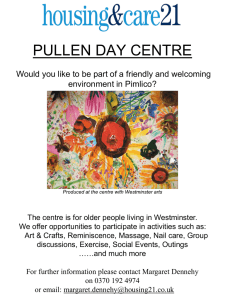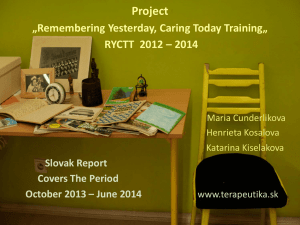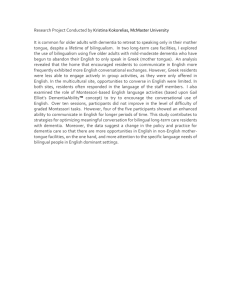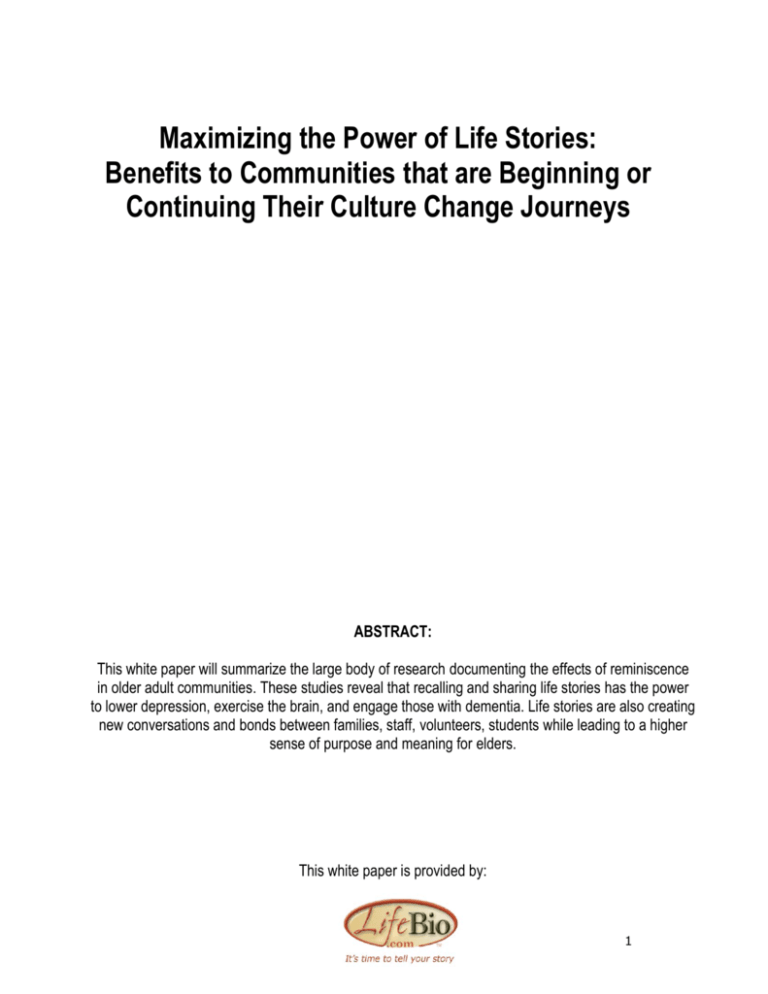
Maximizing the Power of Life Stories:
Benefits to Communities that are Beginning or
Continuing Their Culture Change Journeys
ABSTRACT:
This white paper will summarize the large body of research documenting the effects of reminiscence
in older adult communities. These studies reveal that recalling and sharing life stories has the power
to lower depression, exercise the brain, and engage those with dementia. Life stories are also creating
new conversations and bonds between families, staff, volunteers, students while leading to a higher
sense of purpose and meaning for elders.
This white paper is provided by:
1
Copyright LifeBio, Inc.
All Rights Reserved
LifeBio, Inc.
246 W. 5th St., Suite 204
Marysville, OH 43040
1-866-LIFEBIO
info@lifebio.com
2
Background on the Power of Life Stories
For thousands of years, people from diverse cultures around the world have passed on their traditions, beliefs,
and advice through the telling of stories. These stories have….
explained lessons of life
how to survive in difficult circumstances
why things have happened the way they have
and offered tales of great adventure, tragedy, or love.
In addition to the wisdom passed down, we now know that reminiscence
and life review is a proven way for older adults to gain self worth, learn
more about themselves, and give the gift of their stories to the next
generation. Recalling life stories should be encouraged at any juncture in
one’s life, but primarily as people reach end of life.
There are a number of studies that have shown that reminiscence and life
review affects people’s lives in extraordinary ways. We will explore some
of the outcomes from those studies.
Reminiscence and Culture Change
Work Hand in Hand
Studies have shown that elder communities see remarkable results when
reminiscence and life review is encouraged.
Increases Life Satisfaction
With female nursing home residents, a study randomly assigned
participants to a reminiscence group, current events discussion, or no
treatment group. The results showed significant increases in life
satisfaction in the reminiscence group.
8 Reasons People
Reminisce
1. Teach/Inform
2. Conversation
3. Boredom Reduction
4. Death Preparation
5. Identity
6. Problem Solving
7. Intimacy Maintenance
8. Bitterness Revival
Source: Reminiscence
Function Scale,
Dr. Jeffrey Webster
Improves Resident/Staff Relations
Nursing home residents were interviewed with and without staff present
and in either a reminiscence/life review format or a format more focused on the present time. The attitudes of
residents toward staff improved with reminiscence and with the staff’s presence at interview.
Reduces Geriatric Depression
Newly relocated nursing home residents underwent a study to examine if life review could prevent clinical
depression. Significant positive results were shown in reducing depression at the short-term testing stage with
an additional decrease in depression and hopelessness at one year.
3
Decreases Disorientation, Improves Social Interaction
A study demonstrated it is possible for older people with dementia to reminisce and that this is meaningful for
them in particular, because of the losses associated with dementia. Another related case study used life
review with groups of people with Alzheimer’s disease. They were assigned to groups with some participating
in life reviews and others did not. Results showed significance for life review groups in decreased
disorientation and improvement in social interaction.
Increases Orientation, Competence After Relocation
A case study examined the use of a life review program with newlyrelocated nursing home residents and it was found to decrease
depression, while increasing orientation, perceived competence, and
social interaction.
Increases Sense of Purpose and Meaning
After group therapy with older adults in long-term care setting over an 8week period, this study found that the two treatment groups were
significantly different from control group showing increased sense of
purpose and meaning in their lives.
Is the Telling of Life Stories
Key to Human Development?
Noted psychologist Erik Erickson examined human development by
looking at the conflicts we face at each stage of life.
In Middle Adulthood (40s and 50s), we are most concerned with
Generativity (vs. Stagnation). Generativity, when it is developed, is the
establishment and nurture of the next generation. Through stories, we
help the next generation know what matters most and seek the best for
their lives. There is a concern and commitment to family that’s passed on.
Storytelling is vital for building generativity.
In Later Adulthood (60 years-74 years), Erickson documents the
psychosocial crisis as Ego Integrity (vs. Despair). Ego integrity is the
ego's accumulated assurance of its capacity for order and meaning.
Despair is signified by a fear of one's own death, as well as the loss of
self-sufficiency, and of loved partners and friends. At this stage, the
central task for people to pursue is introspection because they must
decide what will make their lives fulfilling and come together in a
community. This stage can result in a development and sharing of
wisdom—especially through storytelling.
In Later Adulthood, we’re concerned with life but facing the fact that death
will come. According to Erickson, people in this stage of life should have
new intellectual challenges and take on new roles and activities. Writing
What Activities Staff
Members Say…
Person-centered,
individualized activities are
the hallmark of the new CMS
guidelines (F-248). Here’s
what activities staff members
have to say….
“I’m interviewing a resident
and I feel myself getting close
to her and understanding her.
There is a friendship and a
trust that I don’t think you
could get without hearing this
person’s past. It’s very
heartfelt and touching. I
believe it makes you care
about a person more.”
“It’s wonderful to see all these
things about a resident….like
this 90-year-old woman used
to be a basketball jock! It
changed how I see her for the
better.”
“We just started LifeBio with 8
to 10 people in the room.
Everybody was just
introducing themselves to
their neighbors. We took turns
and the staff wrote down what
they said. As they get to know
each other, we think they can
help record each other’s
stories—especially with the
audiotape kit.”
4
one’s autobiography fits the bill by providing that challenge but also giving them a chance for the necessity of
introspection. Through life review, they may also decide, “What’s my next pursuit?”
In Old Age (75 Years-Death), the psychosocial crisis is Immortality (vs. Extinction). This phase is focused on
reflecting back on life. In this phase of life, Erickson cites the positive outcomes of life review, accepting death
with a sense of integrity and without fear. Those who are successful in this phase do review and feel proud of
their accomplishments and have a strong sense of integrity. Those who are unsuccessful during this phase will
feel that their life has been wasted and will experience many regrets—leading to bitterness and despair. The
developmental task, according to Erickson, is to cope with the physical changes of aging while seeing the “big
picture” of life. Through reflection, individuals will see and know their own wisdom.
Autobiography = Chocolate? What the Experts Say...
Dr. Robert Butler, author of Why Survive? Being Old in America, coined the term “life review” fifty
years ago. Before that time, researchers and physicians saw reminiscence as just a stepping stone
toward senility and dementia. He disagreed with this belief and proposed that, as people age,
reminiscence and life review were a normal part of healthy aging. Now large bodies of research show
the positive outcomes from reminiscence and life review.
A Good Reason
Dr. Gene Cohen, author of The Mature Mind, sees
to Start Now
reminiscence as a critical brain activity and he recently
remarked, “Autobiography for older adults is like chocolate for
"All too often we learn all of
the brain.” Cohen cites a 2003 study by Eleanor Maguire and
these wonderful things
Christopher Frith that performed brain scans on people in their
about our residents at their
70s and in their 30s while they were reminiscing. The found
memorial service after it’s too
that the entire hippocampus is “lit up” in older adults, while 30
late.
year olds only utilize one small part of the left hippocampal
region.
We need to learn more about
who they really are while we
Dr. Andrew Weil, author of Healthy Aging, encourages older
have the opportunity--when
adults to keep a record of wisdom, values, and life lessons in
we are lucky enough to be
an ethical will, or heartfelt letter to loved ones. He writes, "An
chosen as their caregivers.
ordinary will … concerns the disposition of one's material
We need to build on the
possessions at death. An ethical will has to do with nonmaterial
relationship between
gifts: the values and life lessons that you wish to leave to
caregivers and elders. What
others…At critical points in your life, take your ethical will and
better way to accomplish this
read it over. Add to it. Revise it and share it with people you
than by helping them write
care about. An ethical will helps you organize your own
their life stories?”
experience and focus on who you are. It's a spiritual inventory
about what you want to pass on to others." Life stories can lead
Donna Gruis,
to a letter from the heart.
Life Enrichment Fort Collins
Good Samaritan
5
How Elder Communities Implement a Successful Life Story Program
Here are a few reasons why communities implement and what steps your community could take to begin.
1) The community sees a life story program as a critical part of person-centered care or their culture
change journey.
2) They do NOT see a life story program as just an activity but it becomes part of the process for
admissions, marketing, social work, and even nursing care. Upfront training of staff members ensures
the programs success and helps it reach as many participants as possible.
3) The elder community involves the community at large as much as possible. Family members,
students, and volunteers are easily plugged into the process, trained, and empowered to tell a
resident’s story.
4) Communities use all different types of media to meet the needs of their residents including a book of
questions everyone can use, a web-based system, audio recording options, and one-on-one and
group activities.
5) Flexibility and an ongoing commitment from all levels of management, and especially executive
management, are keys to success.
How Knowing More Truly Leads to Caring More
“I truly believe that true culture change only happens when people feel they are deeply loved and valued
in their community—whether they are staff members or residents. When people know more about each
other (through sharing those unique and personal life stories), they can really become as close as
family…maybe even closer. I know we can reach a new level of caring.
Elders’ stories become like gold—especially as one ages and experiences loss. When older adults finally
are given an opportunity to have someone really listen and help record their stories and wisdom, they
feel a new sense of peace and happiness. What a gift.”
--Beth Sanders
Founder & President
LifeBio.com
SOURCES:
Webster, Jeffrey & Haight, Barbara. Critical Advances in Reminiscence Work. Springer Publishing. (2002)
Weil, Andrew. Healthy Aging. (2005)
CONTACT:
For more information on LifeBio’s programs for elder communities and community-based organizations, please
call 1-866-LIFEBIO or email us at info@lifebio.com. Please request an information packet on how to
implement LifeBio in your community.
6

